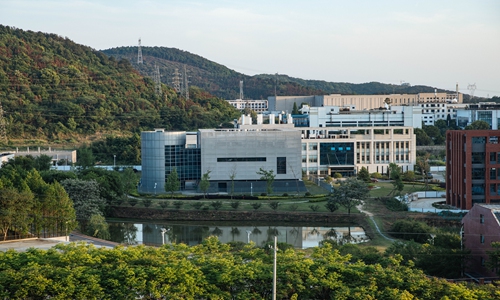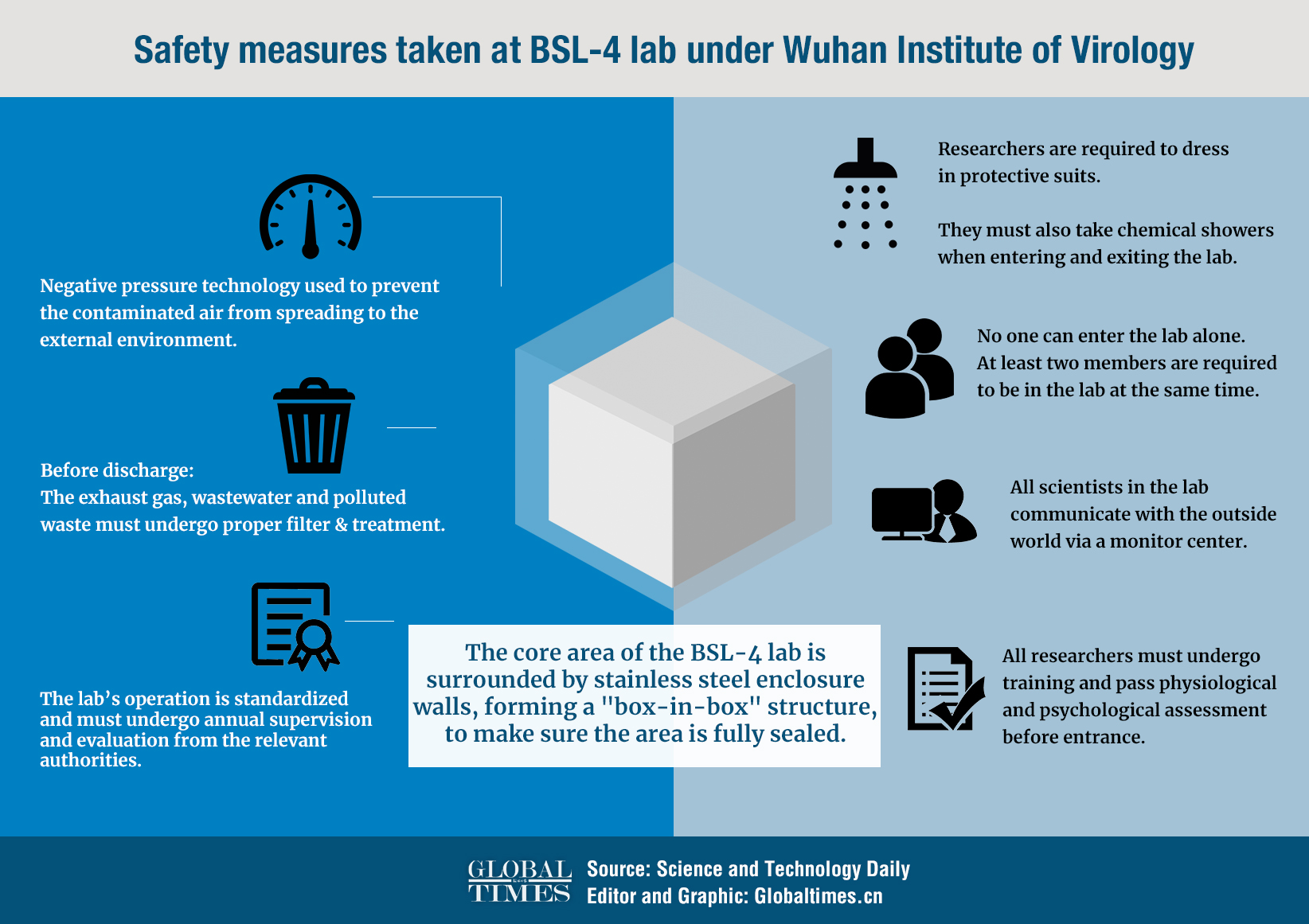Virology institute official explains safety measures, refutes conspiracy theories
By Liu Xin Source:Global Times Published: 2020/5/10 21:28:33

Wuhan Institute of Virology. Photo: Li Hao/GT
A director of the National Biosafety Laboratory in Wuhan, Central China's Hubei Province, explained the facility's biosafety measures on Sunday, including its construction structure and strict procedures for research fellows to enter the lab, amid conspiracies hyped by US media and politicians.
Chinese observers said that instead of making groundless accusations against China's labs, the US should pay more attention to the safe operation of its own virus labs, considering the previous suspicious shutdown of an infectious disease research lab under the US Army.
"Our Bio-Safety Level 4 Lab (BSL-4), also known as P4 lab, has not only the highest level of biosafety measures but also sets strict management systems for research fellows, testing animals and dealing with waste. All these measures have ensured no virus can be leaked from the lab," Yuan Zhiming, a member of the Wuhan Institute of Virology (WIV) and director of the National Biosafety Laboratory in Wuhan, said in an interview with the Science and Technology Daily.
Established in 1956, the WIV is affiliated with the Chinese Academy of Sciences, which is the only institute in China focusing exclusively on fundamental research in general virology.
The National Biosafety Laboratory finished construction in January 2015, and it is Asia's first Bio-Safety Level 4 Lab (BSL-4). There are fewer than 20 countries that have BSL-4 labs. The Wuhan facility passed the assessment of the National Health Commission of China in January 2018 and was then put into use.
The WIV and its BSL-4 lab have been pushed into the limelight since US politicians and the media keep hyping conspiracies that the coronavirus leaked from the lab. The institute and the Chinese government have refuted the groundless theories many times.
Yuan said that the laboratory has one P4 lab and two P3 labs. The laboratory received the samples of the unknown pneumonia on December 30, 2019 and successfully sequenced the COVID-19 virus. The laboratory also urgently applied to the authorities to cultivate the COVID-19 virus, and study rodent infections and non-human primates, to make sure all activity in the laboratory was conducted in accordance with laws.

Infographic:Globaltimes.cn
Yuan said that all research fellows for the P4 lab should have both theoretical and practical training. They also need to get through a yearly evaluation of their physical and mental health. After being qualified, they need to get permission from the director of the lab before entering the lab.
The biosafety staff will ensure that every research fellow's physical signs, including blood pressure and temperature, are in good shape before they enter the lab. Only authorized people could get through the access control system to check the operation of the lab, and they also need to fill in an entry-and-exit registration form and inform the monitoring center, according to Yuan.
Research fellows need to pass the access control system to enter the dressing room, where they take off their clothes and put on a disposable inner protective suit. After checking the positive pressure protective suit, a research fellow will wear it, linking the air tube. After passing the chemical shower room, a research fellow can enter the core room for research, Yuan said.
To ensure biosafety and security, the lab requires at least two research fellows to be working at the same time. They also need to follow the same procedure when going out of the lab and have a chemical shower for disinfection and a liquid water washing of the protective suit.
After taking off their inner protective suits, all research fellows are required to have a shower and put on their own clothes. After filling in the entry-and-exit form, they have accomplished the whole process of research activity.
All contact with the outside world goes through the monitoring center and any incident would be reported to the center immediately. The center would also arrange working staff on biosafety and security to deal with emergencies.
Yuan noted that the P4 lab also has special measures to prevent possible leaks. The core part of the lab was enclosed by stainless steel walls, making the part like a box in another box. The outside wall can also make ensure strength and air-tightness.
The P4 lab uses dynamic sealing technology to ensure differential pressure levels among different functional areas and to prevent the air from being infected by pathogenic microorganisms that might diffuse to less contagious areas.
The air emitted from the lab would go through two highly effective filters to ensure its safety; the water from the lab would be discharged after high-temperature processing of the sewage disposal system. Waste from the lab would go through a double-door autoclave, be safely moved out of the lab and then transferred to a qualified and authorized institute to be dealt with.
Yuan noted that the lab not only has the highest level of biosafety but also requires a strict safety management system for research projects, testing of animals, research fellows and dealing with waste to ensure its effective and safe operation.
Yuan said that the lab needs to undergo evaluation by a third-party institute every year and its operation needs to be checked annually by the national authorities.
Yang Zhanqiu, a deputy director of the pathogen biology department at Wuhan University, told the Global Times this is an active move for members of the WIV to respond to conspiracy theories, as it has been at the center of controversy for months.
Yang said that the strict protective measures of the lab once again showed the world it is impossible for the virus to be leaked from the lab. It is also not located near the wet market as rumored - the lab is at least a one-hour drive away from downtown Wuhan.
As for the current report that the Wuhan lab was shut down for a while in the past year, Yang said that it is impossible, since the air filtration system in the lab has not shut down since its operations began.
China should have more BSL-4 labs to strengthen its capability to study unknown viruses and enhance its ability to deal with major public health emergencies, Yang added.
Chinese analysts said that as China has offered solid evidence to debunk conspiracies and responded to questions, the US should also give explanations to questions from the public about the virus' origins, especially the suspension of its Fort Detrick laboratory and the outbreak flu outbreak since last autumn.
Chinese Foreign Ministry spokesperson Hua Chunying told a press conference on Friday that all available evidence shows that SARS-CoV-2 is natural in origin, not man-made. And she mentioned that many prominent scientists have also said the virus has a natural origin.
Newspaper headline: P4 lab explains safety measures, refutes conspiracy theories
Posted in: SOCIETY